Guest blog written by Bibek Kandel, Sansar Dewan, Pratik Kunwar, Enitan Okediji
“Not everything that matters is written down, it’s all in people’s heads and minds.”
This very mantra, shared by Professor Matt Andrews during our initial Problem Driven Iterative Adaptation (PDIA) sessions in late January 2024, resonated deeply as we, Team Maya, embarked on our journey with Olga’s List (OL), a local non-profit working at the forefront of supporting Ukrainian refugees in Massachusetts. OL is funded by a grant from the U.S. Department of Health and Human Services and the Office of Refugee Resettlement. Private donations fund OL as well. OL helps new Ukrainian refugees arriving in Massachusetts with immediate need of assistance and resources. It strives to help the refugees resettle and integrate into American society.
PDIA emphasizes that the good solutions to complex societal issues are often found not in well documented policies or strategies but in the minds and experiences of those directly involved. It highlights the importance of human interaction, continuous exploration, learning, and iterative adaptation in solving complex problems.
Our group, Team Maya, presented a unique composition with a fun coincidence: three of our team members – Sansar, Pratik, and Bibek —hailed from Nepal, and the fourth member, Enitan, a Nigerian. Considering Harvard Kennedy School’s limited Nepalese student body, this was remarkable. We unanimously chose Enitan as team leader. Each member also took turns leading and contributing to the overall success. Additionally, the diverse backgrounds enriched our teaming exercises, emphasizing learning from each other’s perspectives.
As long as there are problems to address, there will be people behind them to address them – no matter the place or time. The lessons we learned in the past weeks about ourselves, about engaging with teams, and addressing complex problems that come down to people-to-people relationships and improving them. In this regard, sharing and receiving acts of kindness were instrumental, and they served two purposes. First, it acted as a mechanism of psychological safety – we wanted to connect more with our team members when they shared their acts of kindness with us. Second, these acts of kindness helped to create a culture of openness within the team and eased knowing each other’s concerns, strengths, and doubts. Understanding team dynamics management, creating a supportive context for effective teamwork, and team accountability were equally important learning. Maintaining a sense of responsibility towards teammates, along with personal accountability and the pursuit of excellent purpose, task design, providing feedback, and offering some autonomy were crucial elements for productive team learning. These were relevant for both the mission we had ahead of us and our greater purposes beyond the classroom.
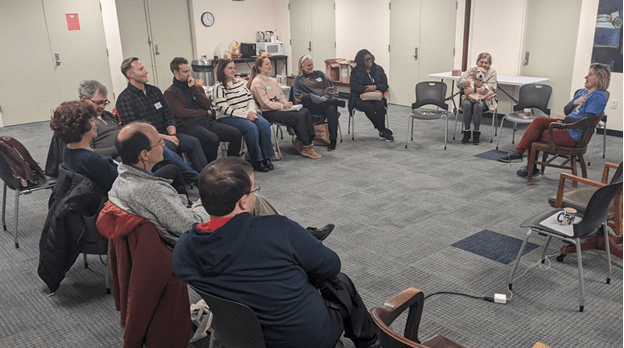
Photo: Enitan Okediji representing Team Maya during the OL’s Retreat
PDIA Framework: Evolution of our understanding
Our initial focus was on addressing the financial constraints that OL was facing in expanding emergency shelter provisions. However, other perspectives quickly evolved as we delved deeper into the issue. Through continuous engagement and reflective practices of problem deconstruction, sequencing and analysis during these six weeks, we uncovered some organizational challenges within OL that it might consider addressing first. This shift in understanding underscored the importance of looking beyond immediate symptoms to the underlying systemic issues.
As we deepened our engagement with OL and its stakeholders, including discussions with Massachusetts legislators and feedback sessions with OL’s authorizer, Gil, and the founder Olga, the complex challenges facing OL became more apparent. It became clear that OL’s struggles extend beyond the need for more funding or temporary shelters; the organization faced internal challenges such as gaps in business knowledge, communication delays, and issues with strategic coherence and agility in decision-making. In addition, inefficient case management and outreach engagement practices were hindering OL’s ability to offer prompt, effective, and well-coordinated support to Ukrainian refugees.
Identifying the need for thorough, adaptable, and accessible process documentation, along with continuous process improvement, is crucial for enhancing operational efficiency, especially given OL’s reliance on a diverse volunteer workforce.
Moreover, there has to be enough communication between the State executive administration and the State legislature regarding the refugee settlement challenge solution to permanent settlement, assimilation into the workforce, and attainment of economic stability. The timing, scale, and condition of refugee influxes introduce significant uncertainty. This presents unique challenges and often leaves insufficient time for stakeholder coordination to effective resource allocation as illustrated in the fishbone diagram below.
Furthermore, enabling community for the community- a plan to build or customize a vibrant Ukrainian-American virtual community and incentivize enough for higher adoption, participation, and engagement for socio-economic and mental wellness assistance among the community is another sustainable idea for OL.
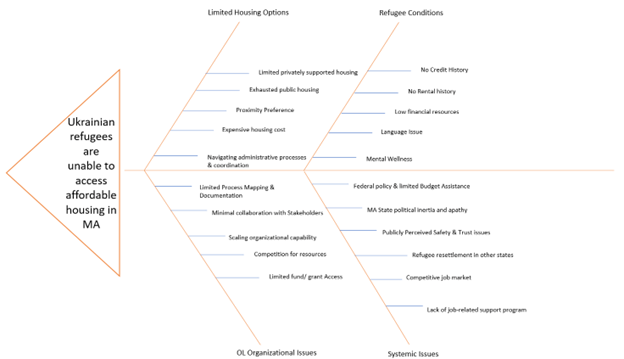
Fig: Illustration of fishbone diagram
Stakeholder engagement:
Moreover, stakeholder engagement emerged as another area that OL might consider, requiring immediate attention. Our conversations with numerous stakeholders between these weeks revealed a need for OL to enhance its engagement strategies with other community organizations and stakeholders operating in the same space. The lack of collaborative efforts among similar organizations was what Team Maya noticed as a missed opportunity for collective action and advocacy that could amplify the impact of Olga’s effort in supporting Ukrainian refugees. Identification of areas of strategic partnership or collaboration and co-design of solutions for resource sharing and optimization for Ukrainian refugee support. Attaining speed and scale to address such uncertain complex problems to avail resources to refugees can be achieved by some digital solutions.
Navigating OL’s challenges through AAAs Assessment:
In the application of the PDIA framework and our reflective journey with OL, one of the pivotal tools that helped us navigate some of the multifaceted challenges was the AAA assessment – evaluating Authority, Acceptance, and Ability.
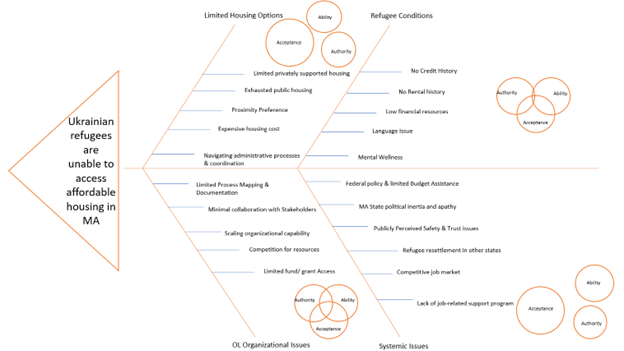
Fig: Illustration of AAA Assessment
It allowed us to dissect some of the core challenges OL was facing, providing a structured lens through which to view the organization’s dynamics and their control and influence over them. Issues with managing formal authority, particularly in leadership communication and decision-making, were evident, alongside a need for enhanced stakeholder acceptance and engagement to foster collaborative solutions. In addition to that, delving further into OL’s operational practices revealed some significant room for improvement in case management efficiency and in-house capacity constraints, highlighting the ‘Ability’ aspect of our assessment as illustrated above.
The key takeaways of the PDIA application:
The PDIA is a useful toolkit to navigate problems and get teams to address them swiftly and effectively in a time-bound environment. As we start to deal with more challenging, complex problems, the tools and skill sets from the PDIA approach will become more pertinent. We will be asking ourselves the same questions we asked at each part of the PDIA journey. “Is this the right problem to address?” “Is there enough acceptance or ability to do this?” “Are the iterations rapid and aggressive enough to build momentum?”. With the concepts and practice of iteration, problem deconstruction, sequencing, AAA analysis, the PDIA process has become like a Swiss knife to us now.
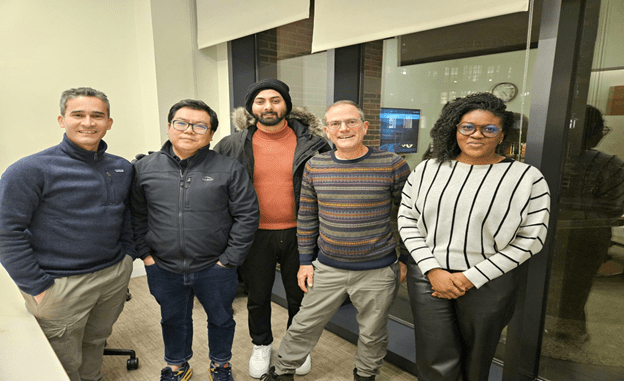
Photo: Team Maya with Authorizer Mr. Gil Kasparek
The essence of PDIA is to embrace rapid learning, revising, iterating and promoting agility through constant real-world feedback and broad engagement. There is continuous learning from real-world experiences and perspectives and deep engagements with as many people as possible. It advises against committing heavily into one big-bang, linear solution that may ultimately fail. If it fails, it fails large.
The challenge of tackling complex issues stems from our tendency to rush to find solutions without fully grasping the problems. Stakeholders may miss important aspects as their priorities differ. Traditional linear approaches struggle with complexity’s dynamic and unpredictable nature, making it hard to maintain authority and legitimacy. Instead, prioritizing rapid experimentation, small wins, and evidence gathering through iterations is essential for crawling into solution design space.
Conclusion
In conclusion, our journey navigating the intricate issues surrounding Olga’s List challenges facing housing challenges for Ukrainian refugees in Massachusetts with the PDIA framework has underscored an essential insight: the core of complex challenges is invariably human-centric. These last six weeks have taught us the immense value of engaging deeply, reflecting thoughtfully, and adapting continuously to understand and address the multifaceted needs and dynamics OL was facing. For fellow students and practitioners working on similar complex issues, we would like to urge you all to remain open to learning from every interaction, to value the iterative process of discovery and solution-building, and to always keep the human element at the forefront in navigating these social and development challenges. The PDIA approach has provided us not just with a method to approach the OL’s challenges, but with a mindset and a set of principles that are applicable across a spectrum of challenges, readying us to make meaningful contributions in whatever contexts we find ourselves in the future.
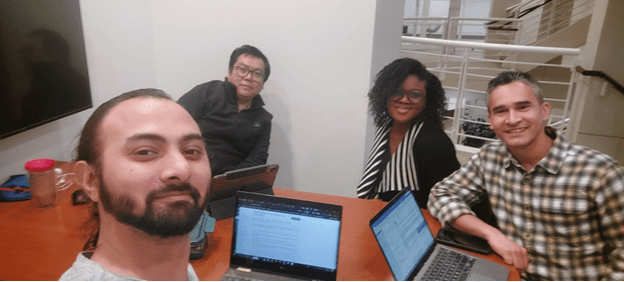
Photo: Team Maya – Pratik, Sansar, Enitan Okediji and Bibek during the final week team meeting
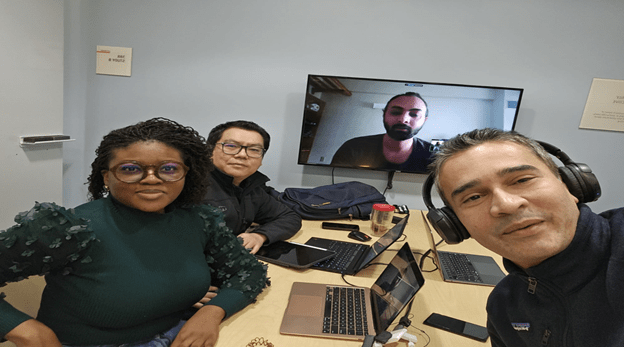
This is a blog series written by students at the Harvard Kennedy School who completed “PDIA in Action: Development Through Facilitated Emergence” (MLD 103) in March 2024. These are their learning journey stories
